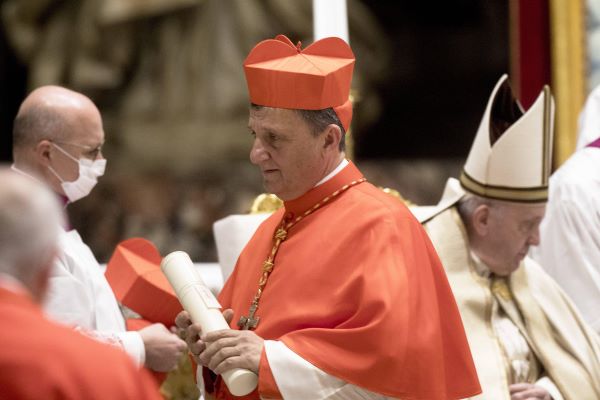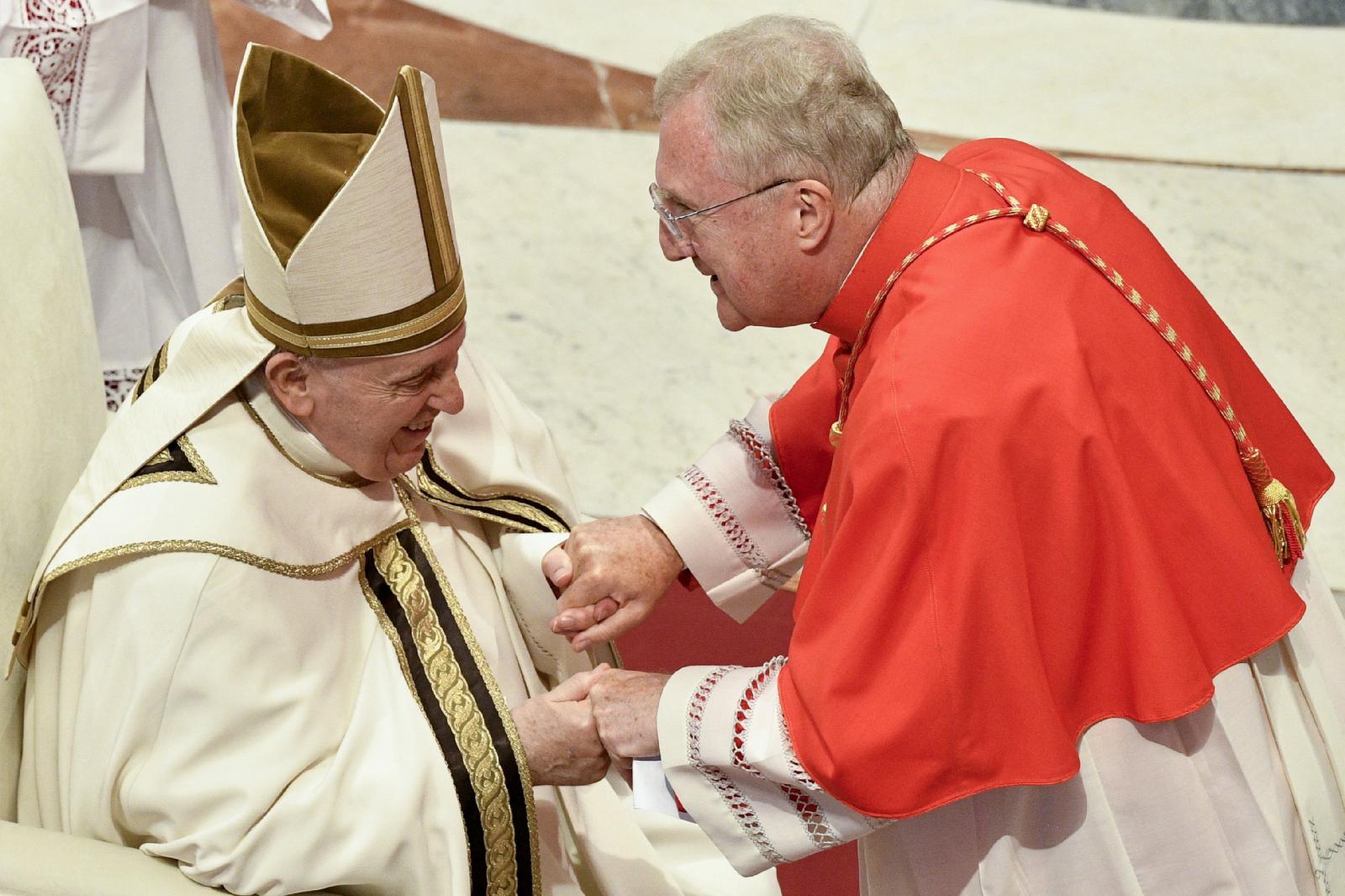England’s new cardinal says those who are “stubbornly opposing” the liturgical reforms of the Second Vatican Council are in danger of adopting a position that is no longer Catholic.
Cardinal Arthur Roche, the Prefect of the Dicastery for Divine Worship and Discipline of the Sacraments, became the third English cardinal to be created by Pope Francis after he received his red hat during a ceremony in St Peter’s Basilica on 27 August.
Roche was among 20 prelates admitted to the College of Cardinals, with 16 of them under the age of 80 and eligible to vote in a future conclave.
The former Bishop of Leeds has one of the most sensitive and demanding jobs in the Church’s central government, requiring him to work closely with the Pope and with the world’s bishops in overseeing Catholic worship.
A trusted adviser to Francis, the Yorkshire-born church leader was recently named by the Pope as a member of the Dicastery for Bishops, an influential Vatican body which plays a critical role in helping the Pope appoint bishops across the world. When Francis read out the names of the latest batch of cardinals earlier in the year, Roche’s was the first on the list.
But the 72-year-old cardinal has also been under attack himself during a time when, as liturgy prefect, he has been closely involved in re-establishing restrictions o
According to the new constitution of the Roman Curia, Roche’s department is tasked with promoting the “sacred liturgy in accordance with the renewal undertaken by the Second Vatican Council”. It’s a point the cardinal was keen to emphasise ahead of his elevation.
“The council is the highest legislation that exists in the Church,” he told The Tablet and the National Catholic Reporter. “If you disregard that, you are putting yourself sideways, to the edges of the Church. You are becoming more Protestant than you are Catholic.”
The reforms to Catholic worship decreed by Vatican II, which emerged from a liturgical movement that dates back to the nineteenth century, included a greater emphasis on the active participation of ordinary believers in the liturgy and saw the sacraments no longer only celebrated in Latin but in local languages.
“After two world wars which had been initiated in the heart of Christian Europe, it was obvious that there needed to be an enormous reform within the Church,” Roche said in reference to Vatican II, which began 17 years after the end of World War II.
“That reform is taking place, but it’s a slow process because there are those who are dragging their feet with regard to this and not only dragging their feet but stubbornly opposing what the Church has actually decreed. That’s a very serious matter. In the end, people have to ask themselves: am I really a Catholic, or am I more of a Protestant?”
The pre-Vatican II liturgy requires a priest to say the prayers of the Mass in Latin, often inaudibly, while facing ad orientem (“facing east” and with his back to the people).
Although a significant minority are drawn to its contemplative, “otherworldly” style, celebrations of the older liturgy have also become a rallying point for dissent from the Francis pontificate and opposition to Vatican II.
When the Pope issued his restrictions on the Old Rite, he told the bishops he was seeking to protect the unity of the Church while ending the suggestion there are two different churches with two different liturgies. These restrictions were then followed up with guidelines on how to apply them by Roche’s office.
Nevertheless, supporters of the Old Rite continue to make their case across various media platforms. Two days before the consistory to create the new cardinals, the American actor Shia LaBeouf announced he had been received into the Catholic Church and said that his conversion was partly due to the older, Latin Mass.
He made his remarks in an interview with Bishop Robert Barron, the leader of the Diocese of Winona-Rochester in the United States who established the Catholic media ministry outfit, Word on Fire. LaBeouf, 36, who won a Bafta in 2008, said he experienced the Latin liturgy while preparing to play St Padre Pio in a new film about the Italian saint. He said the Latin Mass affects him deeply “because it feels like they’re not selling me a car”.
Bishop Barron, who has more than three million followers on Facebook, is visiting London next month when he will address an event in Parliament, celebrate Mass at Westminster Cathedral and give a talk to a gathering of more than 1,000 Catholic leaders. The visit, from 11-18 September, is being organised by Catholic Voices in collaboration with Word on Fire.
In response to LaBeouf’s remarks, Cardinal Roche said it is a priest’s job to talk to people about their experiences of the liturgy and that he’d like to know “why he thinks that, what are his reasons for saying that, and what is his experience”. He emphasised that the Mass should be celebrated with “great dignity” and that this is not a trait that only belongs to the older liturgy.
“The Latin Mass is still available in the 1962 Missal for those who wish for that,” he said, adding that Mass celebrated in Latin in the rite of Paul VI (post-Vatican II) should also be more readily available.
At the beginning of the consistory ceremony in St Peter’s Basilica, Cardinal Roche addressed the Pope on behalf of the new cardinals. It is customary for the cardinal who was named first by the Pope to carry out this task.
“Our mission today is to help you carry this cross and not to increase its weight. With great joy, we wish to walk at your side knowing that to you have been entrusted the keys of the Kingdom,” Roche said in front of a packed basilica with 180 cardinals and thousands of pilgrims who had travelled to Rome for the consistory. “From you, Holy Father, we learn to resist the temptation of any narrowness of mind and heart which shrinks to the size of self instead of expanding "to the measure of the fullness of Christ.”
Among those present in the basilica were several government delegations sent to witness the occasion. The United Kingdom delegation included Lord McFall, the Lord Speaker of the House of Lords and a Catholic, and Lord Ahmad, a Foreign Office minister. Cardinal Vincent Nichols of Westminster and several bishops from England and Wales were also in Rome for the ceremony. After the ceremony, they greeted the new English cardinal in the magnificent “Aula delle Benedizioni” (the Hall of Blessings) inside the Vatican’s Apostolic Palace.
The ceremony marked the eighth consistory of the Francis pontificate and once again showed the Pope’s desire to ensure the men who will take part in a future papal election come from a broad cross-section of the global Church. Over the years, he has significantly increased the number of cardinals coming from Asia, Africa and Latin America.
On 27 August, four bishops from countries that had never had cardinals before, including Mongolia, Paraguay, Singapore and East Timor, were given red hats. Archbishop Anthony Poola of Hydeberad India is the first Dalit (from the so-called “untouchable” caste) to become a cardinal, and Dom Leonardo Steiner is the first to lead a diocese in the Amazon rainforest. Also receiving a red hat was the world’s youngest cardinal, Giorgio Marengo, a 48-year-old Italian missionary in Mongolia, and the Bishop of San Diego, Robert McElroy, a bishop from the United States who shares Francis’ pastoral priorities.
Making cardinals is the closest thing a Pope has to succession planning, and Francis has now chosen 63 per cent of the 132 cardinal electors. In his homily, the Pope urged the cardinals to be attentive to the less public but more pastoral elements of their ministry. He reminded them that Cardinal Agostino Casaroli, the influential Cold War-era Vatican diplomat, made weekly visits to juvenile inmates in a Rome prison and even joked about an Italian priest who knew not only all his parishioners' names but also the family dog.
“A man of apostolic zeal is impelled by the fire of the Spirit to be concerned, courageously, with things great and small,” he said before quoting the phrase: “To suffer no restriction from anything however great, and yet to be contained in the tiniest of things, that is divine.” This maxim was composed in 1640 as a way to describe the genius of St Ignatius of Loyola, the founder of the Jesuits.
Cardinal Roche is now the highest-ranking English-born priest to serve in the Roman Curia since Cardinal Rafael Merry del Val served as the Holy See’s Secretary of State from 1903 to 1914. Roche said he felt “very humbled” by his appointment as a cardinal and that it was an “enormous responsibility” as it meant a “broader remit” for advising the Pope.
He said it was a moment for Church leadership to be “more transparent, more open” and ready to build communion. From 29 and 30 August, cardinals from across the world will gather in the Vatican to discuss the Pope’s new constitution on the Roman Curia, which includes a series of landmark reforms.
Cardinal Roche said the new constitution was about the “nature of the relationship of the Pope with the bishops of the world and using his curia to be a bridge between the two”. He said it meant “greater collaboration at the episcopal conference level and individual bishop level with the See of Peter” while emphasising the Church’s missionary nature.



 Loading ...
Loading ...